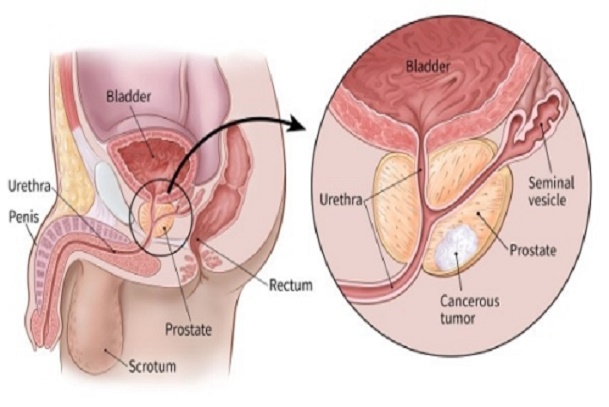 Wash your hands regularly and wear a face mask.
Learn more
Wash your hands regularly and wear a face mask.
Learn more

Prostate Cancer Overview: Introduction
Prostate cancer is the most common and leading cancer diagnosis and the second most common tumor diagnosed worldwide among men after lung cancer.
Prostate cancer is to men what breast cancer or cervical cancer is to women. It begins when abnormal cells in the prostate part of the male organ starts growing in an uncontrollable way. It has the potential to grow and spread quickly, but for most men, it is a relatively slow growing disease, often causing no symptoms until it is in an advanced stage. However it is important to investigate any symptoms or changes that might arise around the prostate.
Most men with prostate cancer die of other causes, and many never know that they have the disease. But once prostate cancer begins to grow quickly or spreads outside the prostate, it is dangerous.
Prostate cancer in its early stages (when it’s only found in the prostate gland) can be treated with very good chances for survival. But when it has spread beyond the prostate (such as to the bones, lymph nodes, and lungs) is not curable, but it may be controlled for many years. Because of the many advances in available treatments, most men whose prostate cancer becomes widespread can expect to live five years or more. Some men with advanced prostate cancer live a normal life and die of another cause, such as heart disease.
A black man is 70 percent more likely to develop prostate cancer than a Caucasian man, and is nearly 2.3 times more likely to die from the disease. Even if you don't smoke you are more likely to develop prostate cancer than to develop colon, bladder, melanoma, lymphoma and kidney cancers combined.
As men increase in age, the risk of developing prostate cancer increases exponentially. About 6 in 10 cases are found in men over the age of 65. That is why it is important and recommended that men aged 40 and above get screened for prostate cancer
The Prostate
The prostate is a small gland about the size of a walnut. It is found only in men and forms part of the male reproductive system and changes in size as a man grows or ages. It sits below the bladder, near nerves, blood vessels and muscles that control erections and bladder function. These muscles include the pelvic floor muscles, a hammock-like layer of muscles at the base of the pelvis.
The prostate produces fluid that helps to feed and protect sperm. This prostate fluid forms part of semen. Semen also contains millions of sperm made by the testicles (testes), and fluid made by a pair of glands called the seminal vesicles. The seminal vesicles sit on the prostate gland.
Prostate Cancer in Nigeria
In Nigeria, prostate cancer is the most commonly diagnosed cancer among Nigerian men. and.
In the year 1997, an estimated hospital prevalence of 127 per 100,000 in Lagos was reported in. And also a data from South - Western Nigeria also reported a hospital prevalence rate of 182.5 per 100,000 male admissions in the hospital during that year. However, the true prevalence in the Nigerian community was not known.
From the year 2018 till date, it was revealed that in Nigeria, about 20,000 men die of prostate cancer every year in Nigeria; one new case of prostate cancer occurs every 3.3 minutes and a man dies from prostate cancer every 20 minutes. Also daily, at least 14 men die in the country and 1 in 5 men will be diagnosed with prostate cancer in their lifetime.
Types of Prostate Cancer
Almost all prostate cancers are adenocarcinomas. These cancers develop from the gland cells (the cells that make the prostate fluid that is added to the semen).
Other types of cancer that can start in the prostate include:
These other types of prostate cancer are rare, so whenever an individual is told of having prostate cancer, it is almost certain to be an adenocarcinoma.
[Next Week: Causes and Prevention of Prostate Cancer]